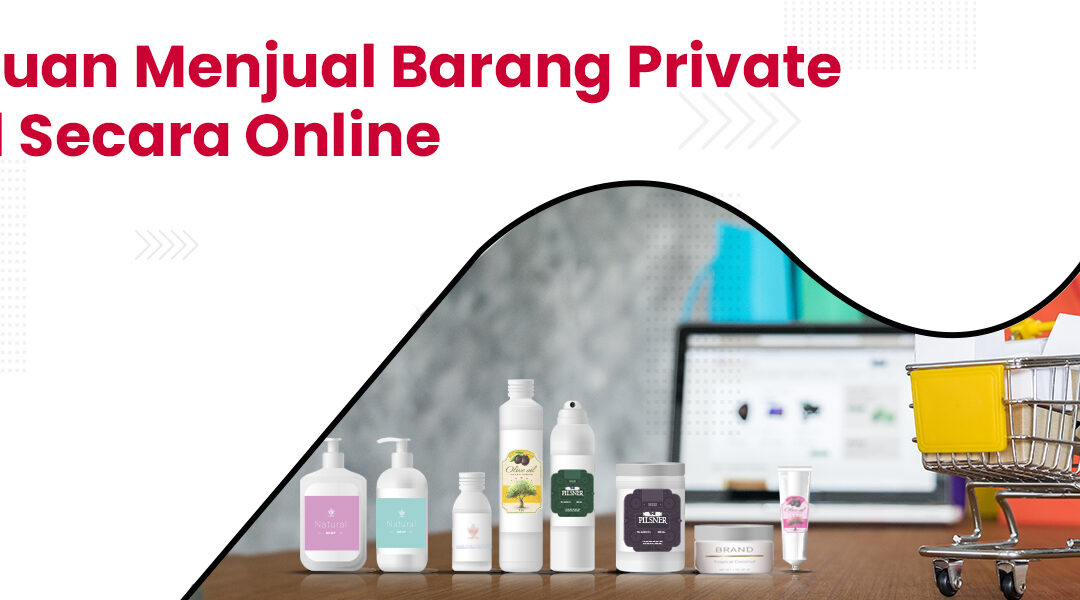The sale of private label goods or private brand goods may sound foreign to our ears. But what if many goods that are known by children to parents are also private label goods? Selling an item throughout the country or even the world sounds pretty intimidating. It requires a lot of expertise and capital, you have to build manufacturing units, warehousing, and establish production lines to create a logistics system. Because of this, many people are still hesitant or even reluctant to start a business.
However, today you don’t need to have a manufacturing unit and experience a series of processes that are quite difficult in the business world, especially e-commerce. In many e-commerce business models, you don’t even have to touch the product you’re selling. One way is to sell private label goods.
You can sell things that you don’t produce to many people. Let’s understand this business model together!
What is private labeling?
Private brand goods or private label goods is a business model in which a product is made by one company and sold by another company under their own brand. Private labels are better known as “store goods” in Indonesia.
For example, you want to start a t-shirt business in e-commerce, but you don’t have the capital and resources needed to manufacture that item. Finally, you go to a clothing manufacturer to produce clothes with the specifications, brand and logo you want on a large scale. After the production process is complete, then you can sell the t-shirts on e-commerce.
This is an example of private labeling. This concept is almost the same as you have a label or brand without realizing it. The private labeling business model is often equated with white labeling business practices, but in fact the two things are different.
In the practice of white labeling, you cannot adjust the product specifications to be produced by the manufacturer or manufacturer because the specifications have already been determined, and you have to sell it with your own label or brand. Whereas in private labeling, you can freely arrange the products that you will sell.
How do you start selling private label products?
Do a brainstorm to determine the product
First of all you have to hold a discussion or brainstorming session to determine the final product and an existing niche market is the first step you have to do. Don’t be in a rush to finalize your product, first do research on what consumers need. Always choose products that are currently in demand by consumers, compared to the products you like.
Use the available tools to conduct product research and market research regarding consumer needs. You can also try selling local products that have potential.
Try asking the following before you decide what product you want to sell:
- What is the market share of this product?
- How is the fluctuation of the demand for this product?
- Is this product currently in demand?
- Does this product require a lengthy permitting process and paperwork?
- What is the return rate of this product and what are the developments for this product so that it can continue to survive?
Determine the specifications of the product to be sold
After completing market research, immediately determine the specifications of the product you are going to sell. Your product specifications can help you stand out from your competitors. Always remember that the majority of Indonesian consumers want high quality products at low prices. Product quality will not be able to lie to consumers, add value to your product and sell it at an affordable price.
You can consider a few things:
- Never sell illegal goods
- Viral products will not be able to provide consistent profits
- Avoid products that require permits and documents that are quite difficult, such as items related to medical needs
- Avoid products that easily have quality problems, such as electronics. And products that require an SKU such as clothing.
Do market research
Do market research that focuses on analysis. After you have decided on a product, do a due diligence test to make it relevant in the market before bringing it to a manufacturer or manufacturer. Also do market research regarding consumer needs, competition, response to similar goods, and existing price ranges.
Find the right manufacturers and suppliers
Finding manufacturers and suppliers who can produce quality goods to your specifications is not easy. You can use the website to find producers spread throughout Indonesia.
Before deciding on a manufacturer, consider these things:
- Review their work
- Check their relationship with previous clients
- Delivery time
- quality assurance
- Prices for their products
It is highly recommended to try contacting 2 or 3 manufacturers first for comparison. You can ask for samples of their products with the specifications you want. Make sure the manufacturer has good communication skills and understands your needs.
Give a brand identity to your product
It takes a lot of strategic planning and effort to build a brand, the foundation is laid at the beginning when the product will be produced. If you sell private label products, you can sell existing items with their own labels, designs and packaging. Try communicating this with partner manufacturers to produce goods that match your brand identity.
Define a fulfillment strategy
Shipping and fulfilling orders is something that is quite difficult, problems or problems often occur in this matter in business. The process is divided into two, the first is the process of sending goods from the producer to the warehouse or inventory, and the second is the process of sending goods from the warehouse to the consumer’s address.
The shipping process from manufacturers to warehouses or inventory requires more attention, because the shipments may be shipped from overseas. In international shipping, you need to pay attention to the safety and security of cargo and arrival time, you also have to pay attention to permits and existing documents as requirements.
To do these things, you need a trusted shipping partner or logistics aggregator like NimbusPost who can help you choose a delivery partner that suits your needs.
Optimize your product to increase sales
Now you have a product to sell. You only need to sell your product by uploading it to the site or e-commerce platform of your choice. You also need to carry out promotions by way of advertising and other optimizations. Try applying SEO friendly principles to product descriptions, using clear images, and also utilizing email marketing, social media marketing, paid advertising services, and content marketing to drive sales.
How to develop private label goods?
Optimizing product pages for SEO
To make your product visible to consumers, you need to optimize your website and product pages with existing algorithms. Even when you sell with an e-commerce platform like Amazon, this is because Amazon has a search engine with its own algorithm that can display many products.
By providing SEO-friendly product descriptions, improving product images or photos, and detailing your product brand and item specifications such as color, size, and more.
Bring something different to your product
The private labeling business is a profitable business with relatively little competition after the covid-19 pandemic. But now, many have returned to buying goods through different online stores or online marketplaces, this has made the competition even tougher. Therefore, you have to present something unique as a differentiating factor in your product so that it can stand out more.
Get Customer Reviews
8 out of 10 consumers decide to buy a product after reading reviews from other consumers. Even if buyers have never personally handled the product, they trust other people’s experiences. Getting positive reviews will help you sell your product.
Use social media
The use of billboards, advertisements in newspapers, and other traditional media to promote and drive sales of products is a thing of the past. Today, many use social media as a means of omnichannel promotion to get consumers. Take advantage of social media to sell your products, use paid advertisements, upload product photos, and take advantage of other multimedia tools such as Instagram reels.
Content marketing
You must have heard the term “content is king” and this term is not an ordinary term. Content marketing is a strategy that can be used to get qualified leads. Even though it takes some time, content marketing can bring in leads for you.
Use email marketing
Using email marketing is a fairly successful strategy for bringing in customers with conversion rates of 5% or higher compared to websites. Therefore, email marketing is a mainstay of digital marketers. Use email marketing to drive purchases, upsell, and retarget consumers.
Conclusion
Even though there is stiff competition, selling private label goods is an easy option for starting a business in e-commerce. You only need to think about selling existing products.
Keep in mind that if you start selling private label goods, you also have to pay attention to the existing logistical issues. Even an experienced seller sometimes has difficulty dealing with obstacles such as late delivery, loss of cargo, damage to goods during delivery, and others
It is highly recommended to use a delivery partner like NimbusPost to handle those things. NimbusPost provides delivery solutions with technology and automation that can provide courier recommendations and delivery services according to existing needs.


